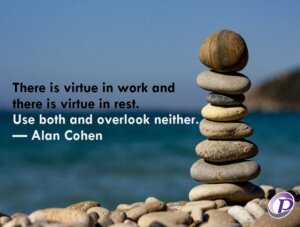
2 min readThe Best Know How To Recover
by Guy Gage | October 17, 2021 | Business, Leadership, Personal Management

Recovery Discipline Is Necessary
No performer in any endeavor expects to sustain high intensity training or performance with no breaks. Every high-functioning performer understands the cycle of their work. The research has shown that top performers, in whatever setting, schedule and adhere to a discipline of recovery as diligently as they do their training and performing. Do you?
Do you schedule your recovery time?
I remember an earlier day when I would schedule training, coaching and facilitation meetings back to back to back to back… For me, it was a badge of honor to be able to endure the extended, fast-paced workload. But eventually it would catch up to me and I would temporarily lose my motivation to do what I love. That’s not a good sign. I soon found that regardless of my love for my craft, I had to accept the fact that, without recovery, there is declining enjoyment.
That’s when I began actually scheduling recovery time. I intentionally set aside specific activities just for recovery’s sake. I like to read, so I have a book ready. I like to go for walks up and down the hills so I make time for that. I like to tinker in the shop, so I have a project or two in mind. Aside from my normal routines and rituals, most things are discretionary, meaning I don’t have to be “on.”
At first, it was difficult because I had to battle the belief that time is wasting if it wasn’t filled with things to do, places to go and people to see. Fortunately, I learned these lessons before I experienced burnout, which has finally been designated as a real thing—a medical condition with a treatment plan.
I have to acknowledge that it is common for my coaching clients to report that they haven’t been very intentional with their recovery. They think about it but don’t plan it. They plan it but don’t schedule it. They schedule it but don’t follow through. Some hold to the idea that recovery is for the weak, which itself is a demonstration of weakness. The inability to accept the limitations of full intensity undermines your ability to perform.
What Is Your Recovery Plan?
Do you plan for and schedule your recovery ahead of time? It isn’t a good idea to wait until you are ready for it. You should make it a part of your entire performance planning and preparation. And I’m talking more than just blocking off time on your calendar and composing your away message. You have your own needs and preferences of how to recover and if you don’t take care of yourself, you aren’t likely to survive or enjoy the long haul.
Today, look at your discipline of recovery and how it matches the intensity of your work. Why? Because the best know how to recover.
Read Related Blogs:
Leading with Certainty: Anchoring Leadership in Vision and Values
Effective leadership is grounded in the certainty of what is known: the long-term vision, enduring values, and guiding principles that define an organization’s identity. In a recent coaching conversation with a senior leader navigating a period of rapid change, this...
Courageous Leadership: Understanding Fear in Times of Change
In the midst of writing last week’s Monday message, I was preparing to facilitate a session titled Courageous Leadership: Navigating Change, Fear, and Uncertainty. During that session, one of the attendees questioned the use of the term fear. She didn’t feel that fear...
Navigating Change: Leading with Strength and Vision
Change can feel unsettling, but great leaders know that navigating uncertainty requires two critical elements: certainty and relatedness. When people feel secure in their direction and connected to those around them, they can embrace transition with confidence. Create...



